Governing the City State - Chief Minister and Treasury Directorate ...
Governing the City State - Chief Minister and Treasury Directorate ...
Governing the City State - Chief Minister and Treasury Directorate ...
Create successful ePaper yourself
Turn your PDF publications into a flip-book with our unique Google optimized e-Paper software.
Australia, should be capable of significant institutional agility. However, <strong>the</strong> power oftraditional hierarchical public service governance arrangements <strong>and</strong> structures which stifleinnovation, encourage insular siloed thinking, <strong>and</strong> make whole of government collaborationhard is evident in <strong>the</strong> ACTPS. It is evident from staff consultations that <strong>the</strong>re is a genuine<strong>and</strong> powerful desire to be innovative <strong>and</strong> improve how <strong>the</strong> ACTPS works. At <strong>the</strong> same time,however, it is equally evident that <strong>the</strong> dominance of risk adverse entrenched cultures <strong>and</strong>norms of behaviour make working this way very difficult, if not impossible.Citizen-Centred Governance <strong>and</strong> Public ValueThe increasing desire from within <strong>and</strong> outside public services to engage citizens in policydesign <strong>and</strong> decision-making <strong>and</strong> in program design <strong>and</strong> delivery, has been <strong>the</strong> focus ofsignificant academic <strong>and</strong> practitioner thought in recent years. Within <strong>the</strong> broader organisingframe of agility outlined above, genuinely participatory decision making offers significantscope to improve <strong>the</strong> quality of support to <strong>the</strong> Government’s strategic policy setting as wellas to <strong>the</strong> quality of service delivery to <strong>the</strong> citizenry.The Organisation for Economic Co-operation <strong>and</strong> Development (OECD) notes governmentshave been slow to embrace <strong>the</strong> advantages of participatory decision making, but argues:informing, consulting <strong>and</strong> engaging citizens are core elements of good governance, means forpromoting openness, <strong>and</strong> a sound investment in better policy making. They allow governmentto tap new sources of policy-relevant ideas, information <strong>and</strong> resources when makingdecisions. Equally important, <strong>the</strong>y contribute to building public trust in government, raising<strong>the</strong> quality of democracy <strong>and</strong> streng<strong>the</strong>ning civic capacity. 56Increasingly, discussion about deepening community engagement in governance frameworks<strong>and</strong> decision-making is being viewed through <strong>the</strong> prism of Public Value Management, <strong>and</strong> inthis context, <strong>the</strong> ANZSOG Institute for Governance at <strong>the</strong> University of Canberra argues NewPublic Management, so influential in public services through <strong>the</strong> 1980’s <strong>and</strong> 1990’s, is:now simply unequal to <strong>the</strong> challenge of public service provision in an era of governance. Thisis because it privileges <strong>the</strong> role of technocrats, takes <strong>the</strong> politics out of public policydeliberation <strong>and</strong> its market orientation is at odds with <strong>the</strong> concept of public service sittingmore easily with <strong>the</strong> language of <strong>the</strong> consumer ra<strong>the</strong>r <strong>the</strong> language of <strong>the</strong> citizen. Inconsequence, <strong>the</strong> success of public service reform rests on <strong>the</strong> development of citizen-centredgovernance structures which can meet <strong>the</strong> dem<strong>and</strong>s of both representative democracy <strong>and</strong> <strong>the</strong>efficient delivery of public goods. 57The notion of public value was coined at <strong>the</strong> Harvard Kennedy School by Mark Moore in1995 58 <strong>and</strong> <strong>the</strong> emergence of a Public Value Management paradigm reflects a shift in focusfrom Government to governance brought about by increasing reliance on non-government56 Organisation for Economic Co-operation <strong>and</strong> Development (2003) Open Government: Fostering Dialogue with Civil Society,Paris, p.11.57 ANZSOG Institute for Governance (2009) Reform of Australian Government Administration: Building <strong>the</strong> world’s best publicservice – A Submission by <strong>the</strong> ANZSOG Institute for Governance at <strong>the</strong> University of Canberra. Canberra, p.5.58 Moore, M (1995) Creating Public Value – Strategic Management in Government. Harvard University Press, CambridgeMass.<strong>Governing</strong> <strong>the</strong> <strong>City</strong> <strong>State</strong>: 61



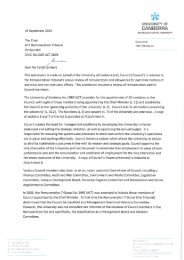
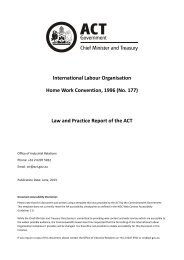
![HSR Training Programs Guidelines [ PDF 191KB]](https://img.yumpu.com/51348280/1/190x245/hsr-training-programs-guidelines-pdf-191kb.jpg?quality=85)



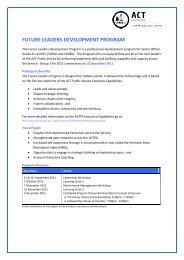


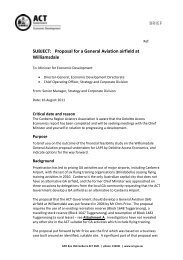
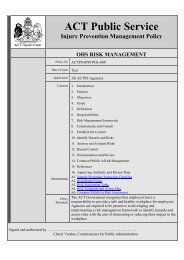
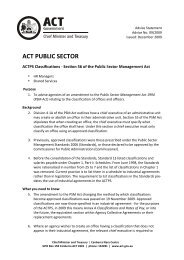
![Teachers Technical and Further Education [ PDF 68KB]](https://img.yumpu.com/34230751/1/184x260/teachers-technical-and-further-education-pdf-68kb.jpg?quality=85)
